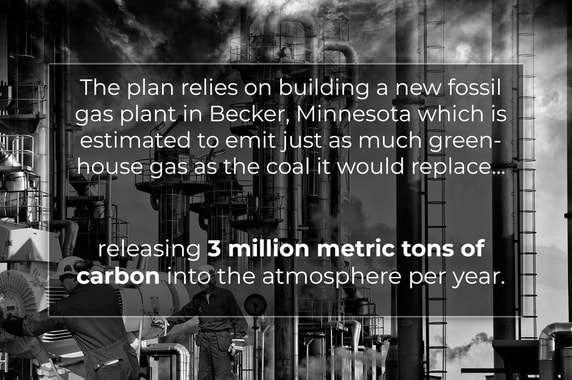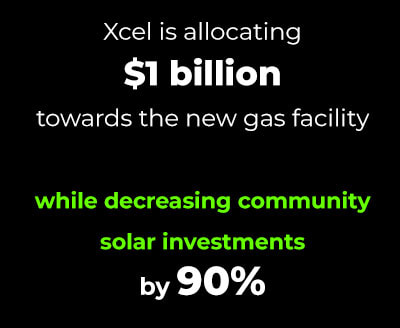 by Autumn Saign Xcel Energy, Minnesota’s largest utility provider, has a lot of influence on how energy is generated and distributed throughout the midwest. The corporation has the power to lead the state towards resiliency or impede our progress. Along with simply supplying our homes with electricity, Xcel must also be held accountable for a commitment to fighting climate change and prioritizing environmental justice. Xcel’s proposed 15 year plan, the Integrated Resource Plan (IRP), outlines how the company will provide energy from now until 2034. This report card gave Xcel failing grades in equity, avoiding fossil gas, and energy independence. The new plan is woefully inadequate from both an environmental and social perspective. If approved by the Public Utility Commission (PUC), the IRP will allow the provider to continue relying on fossil fuels and further widen the persisting economic and racial disparities in Minnesota. We cannot ignore the contradictions within the IRP. The document boasts of goals such as an 80% reduction of carbon emissions and the elimination of coal by 2030, yet a major component of the plan relies on building a new fossil gas plant in Becker, Minnesota. This facility is estimated to emit just as much greenhouse gas as the coal it’s intended to replace. Releasing three million metric tons of carbon into the atmosphere per year doesn’t sound like they’re really all that committed to carbon reductions, right?  Xcel’s new plan betrays both the human and nonhuman environment. The quality of the environment is intimately linked to concerns of human equality. Environmental degradation is an issue of social justice. The most polluted places are often the areas with the greatest social and economic disparities. Extracting energy from fossil fuels comes with unavoidable consequences. The communities surrounding these facilities, often consisting of low income populations and people of color, experience disproportionate amounts of pollution present in their daily lives. Constructing a new fossil gas plant, which comes with another invasive pipeline, is an act of environmental injustice. Xcel is allocating one billion dollars towards the new facility while decreasing community solar investments by 90%. The IRP commits to adding 273 Mega Watts to community solar power over the next decade. That number may seem high, but in 2018 alone Minneapolis established about 200 MW of decentralized solar power. Over a span of ten years, ~300 MW is brazenly insufficient. Distributed solar, such as rooftop solar gardens, benefits the community and the climate simultaneously. Pollution and energy cost burdens decrease while the resiliency of the electrical grid increases. The IRP needs to support the expansion of decentralized, renewable energy systems if Xcel is to actually commit to reducing carbon emissions and pursuing equity.  The deprioritization of community solar further reveals Xcel’s true agenda. Xcel has delivered the IRP as if their new plan is designed for the consumer, but ultimately they are aiming to maximize profits just like any other monopolized corporation. Large, centralized energy facilities, such as the proposed power plant in Becker, are the easiest way for utility providers to profit the most. Shareholders are even guaranteed a high rate of return (10%) on their investments, and this interest is paid for by taxpayers and reflected in our energy bills. It’s also likely that the new gas plant will be shut down for economic reasons before it’s up for retirement, leaving consumers to pay for the millions of dollars of stranded costs. Utility providers have the advantage of appearing as if they’re institutions providing a public service, but they are profit motivated and actually legally responsible for making as much money as possible for their shareholders. Profit motivation is nothing new, but climate change is simply an expense we cannot afford regardless of revenue. Energy is an environmental issue, a social issue, and a political issue. We are existing in an era of mass uncertainty and injustice. As a leader in the industry, Xcel has the authority to influence the actions of other national utility companies along with the resources needed to transform the energy standard. Xcel’s 15 year plan must be revised to include more aggressive policies to move Minnesota towards a future of renewable and decentralized energy systems. Xcel is responsible for building and maintaining energy infrastructure and we are responsible for paying for it. Following this logic, what we want should matter. Utilities are for people. Bottom line? We are in a climate crisis that disproportionately impacts vulnerable communities, and we simply cannot afford to continue expanding fossil fuel infrastructure.The good news is that we can (and have the legal right) intervene. The PUC is required to accept and consider the public’s input before approving the IRP. We cannot allow Xcel to further accelerate climate change and continue enacting racial injustice. Submitting a comment is easy. You can dispute the IRP by mail, email, online, or through an organization. Please take the time to submit a comment to the PUC by February 11th, 2021, and share with your friends and family. Easy directions, contact info, and comment outlines can be found here. “In this climate crisis; in the wake of George Floyd’s death and the need to end a legacy of racism across the country, we can accept nothing less than a plan that seeks to heal both our planet and our communities.” - Patty O’Keefe & John Farrell of the Minnpost
0 Comments
Leave a Reply. |
AuthorChris Torres Archives
December 2023
Categories |

 RSS Feed
RSS Feed
